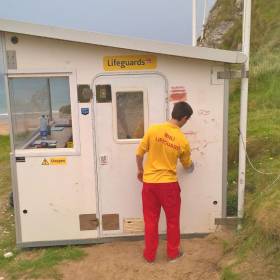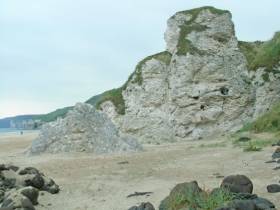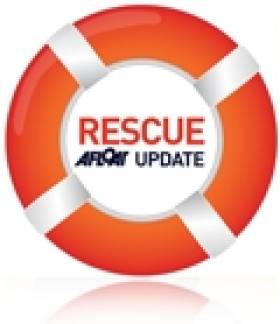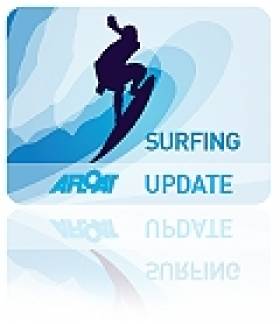Displaying items by tag: Whiterocks
Vandals Damage Beach Lifeguard Unit On Causeway Coast
#Vandalism - Vandals have caused an estimated £800 (€900) worth of damage to an RNLI lifeguard unit at Whiterocks on the Causeway Coast.
Following two of the busiest days of the summer season so far in Northern Ireland, the RNLI team at Whiterocks arrived at work yesterday morning (Wednesday 19 July) to see that their unit, located near the entrance to the North Coast beach, had been extensively damaged.
The charity’s lifeguards discovered that the vandals had left behind broken bottles and a barbecue, while the unit’s aerial mount required for VHF communications had also been damaged.
A large rock which had been thrown at the hut damaged the unit’s outer skin, piercing the inner plywood and leaving a two-inch hole in the unit, which was also covered with indecent graffiti.
RNLI lifeguard supervisor Karl O’Neill said the damage to the aerial mount had threatened vital VHF communications, while the rock damage meant the unit was no longer watertight.
“Our lifeguards rely on the aerial to communicate with each other when on patrol and to communicate with their colleagues in the coastguard in the event of an emergency,” he said.
“Thankfully the damage has not rendered our communications off-service but should it have, and should it have happened during the last two days, which brought thousands of people to our beaches to enjoy the good weather, lives could have been put at risk.
“It is very disappointing for our lifeguards, who have been working hard to keep people safe, to turn up this morning after two busy days and see the unit they need to carry out their job has been so badly damaged. It really does dampen spirits.”
It is estimated that the repairs to the beach lifeguard unit will run into hundreds of pounds for the charity.
The RNLI is working closely with the PSNI who have appealed for anyone with any information to come forward.
“We would appeal to those doing this damage to be mindful that the RNLI is a charity,” said O’Neill. “Our lifeguards are an essential part of what is a seamless rescue service that saves lives from the beach to the open sea.
“Our lifeguards’ primary role at Whiterocks and on all lifeguarded beaches on the Causeway Coast is to make sure the beach can be enjoyed safely by the public. We want them to be able to continue to do that safely and with peace of mind.”
Portrush Lifeguard Aids Man Injured In Whiterocks Cliff Fall
#CliffFall - An RNLI beach lifeguard aided a man who fell onto rocks while walking a steep cliff path on Whiterocks beach in Portrush yesterday afternoon (Wednesday 30 March).
The call for help came after a member of the group the man was with observed him fall just before 1pm and raised the alarm.
After arriving on scene, senior RNLI lifeguard Jamie Russell immediately began to administer casualty care to the conscious man, who had fallen some 12 feet from the coastal path. He was joined on scene by a paramedic and they continued to provide assistance.
However with an incoming tide and a challenging location, it was decided that removing the casualty would require the assistance of Coleraine coastguard.
The man was secured on a stretcher and carefully moved by the group around the rocks to a waiting ambulance.
Commenting on the callout, RNLI lifeguard supervisor Karl O’Neill said: "This incident was quite a challenging one to respond to due to the nature and location of the fall.
"Thankfully the man was conscious but we did not want to risk any further discomfort or injury by moving him ourselves. I would like to thank members of Coleraine coastguard for their assistance."
Whiterocks is one of five beaches being patrolled by RNLI lifeguard during the Easter holidays, continuing till Monday 4 April, as previously reported on Afloat.ie.
RNLI Lifeguards Assist Paddle Boarders On Whiterocks Beach
#Rescue - RNLI lifeguards assisted two stand-up paddle boarders on Whiterocks beach in Portrush on Saturday (11 July) during strong offshore winds.
Senior RNLI lifeguard Bosco McAuley spotted two people in difficulty at 3.40pm approximately 100 metres out to sea within the lifeguards flagged patrol zone on the beach.
The two women were both on stand-up paddle boards when they got caught off guard by a strong offshore wind. Weather conditions were described as overcast and windy at the time, with about 1-2 foot of surf.
After observing the situation, McAuley asked his RNLI lifeguard colleagues Bruce Traill and Ali Boyd to assist. Traill quickly put on his RNLI rescue watercraft kit while Boyd launched the jetski into the water.
McAuley then proceeded to the two paddle boarders and assisted them safely back to shore before going back to retrieve the two paddle boards.
"Offshore winds during the summer season can cause issues on the beaches, when these situations arise we are on scene and can quickly deal with them to ensure the public’s safety," said McAuley after the rescue.
RNLI supervisor Tim Doran added: "Anyone who gets into difficulty the water should try to remain calm, raise their arm and signal for help. Our lifeguards are well trained when it comes to spotting people in danger in the water and are quick to respond."
" With numbers on the beaches expected to increase for the July holidays this week, Doran reminded people to be mindful of the RNLI’s key safety advice – particularly for those planning to use the water.
"If you are planning on visiting a beach this summer, choose a lifeguarded beach and swim between the red and yellow flags, which mark the safest area to swim and are an indicator that lifeguards are on duty.
"If you see someone else in trouble in the water, call on the help of a lifeguard or dial 999 and ask for the coastguard."
Portrush Surf Cam Goes Live
Surfing action from Portrush can now be enjoyed from all around the world following the launch of a live webcam at Whiterocks Beach.
Martin Kelly of Portrush Surf School teamed up with the town's Royal Court Hotel to set up the webcam at the popular surfing spot as a tool for travelling waveriders to check out conditions from a distance.
"By checking the webcam they can now see first hand exactly what the waves are doing, saving them time and money on a potentially wasted journey," the former Irish surfing champion told the Coleraine Times. "This is a case of know before you go."
The movable camera will allow for many different views of the Co Antrim beach that will surely appeal to more than surfing fans.
To view the webcam visit www.portrushsurfschool.com
































































